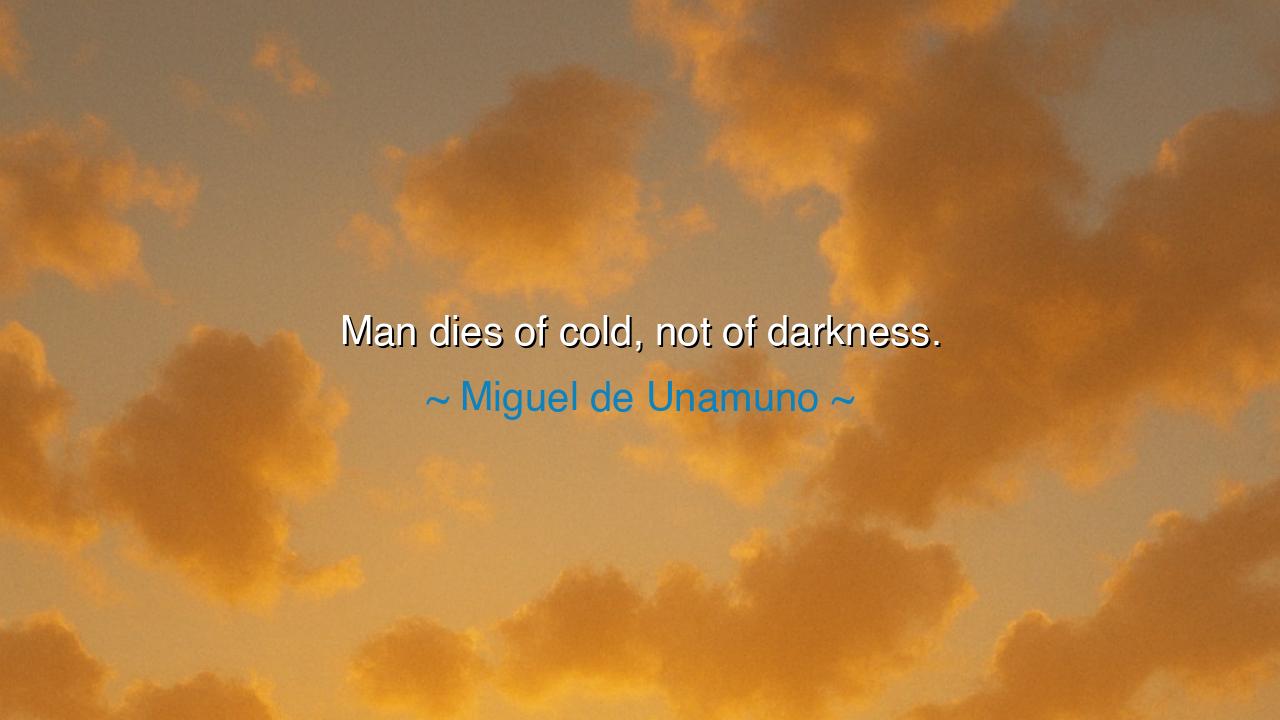
Man dies of cold, not of darkness.






The words of Miguel de Unamuno, “Man dies of cold, not of darkness,” are brief, yet they strike with the weight of eternity. In these few syllables, Unamuno — philosopher, poet, and prophet of the human soul — reminds us that it is not the absence of light, but the absence of warmth that destroys the spirit. A man can walk through darkness if his heart still burns; but if that flame within him freezes, even the brightest day becomes a tomb.
To the ancients, light symbolized knowledge, and warmth symbolized love. Unamuno’s insight joins these symbols into one great truth: it is not ignorance that kills, but indifference. The cold he speaks of is not the chill of winter, but the frost of apathy — the slow death of compassion, the numbing of feeling, the silence of hearts that no longer reach for one another. A world without warmth is one in which man ceases to care, and therefore ceases to truly live.
This wisdom was born from Unamuno’s own struggle. Living in a Spain divided by ideology and cruelty, he saw how men who claimed to serve reason or faith could become merciless. He understood that the greatest danger to humanity is not darkness — not mystery, not ignorance — but the loss of human tenderness. He stood before generals and dictators and said, “You will win, but you will not convince,” for he knew that reason without mercy is cold iron, and victory without love is hollow.
History gives us many mirrors for this truth. Consider the story of Viktor Frankl, the psychologist and survivor of the Nazi concentration camps. In the blackest night of human history, he found that men did not perish from the darkness of ignorance, but from the cold of hopelessness. Those who lived were not the strongest in body, but the warmest in spirit — those who still found meaning, who still shared their bread, who still whispered words of comfort to others. Frankl’s life proved Unamuno right: man can survive any darkness if there remains a spark of love, a reason to hope.
And so this quote is not a lament, but a commandment of warmth. It calls to those who live in cynical times — when faith wanes, compassion cools, and ambition hardens the heart — to guard the fire within. For knowledge alone does not save us; brilliance without kindness is a star that gives no heat. The world may grow dark, but as long as one soul burns with empathy, the night cannot conquer.
The cold Unamuno warns of also dwells within individuals. It creeps in quietly — through disappointment, betrayal, or loss — until the heart becomes numb to joy and sorrow alike. But he teaches us that to feel, even to suffer, is to remain alive. Better to weep in the storm than to sleep in the frost. Better to keep the heart in motion, even when the world feels cruel, for warmth is born of connection, and connection is the lifeblood of the soul.
So, dear listener, learn this from Unamuno’s wisdom: fear not the darkness of ignorance, but the coldness of indifference. Tend the fire of your compassion as the ancients tended their sacred hearths. Offer warmth where others bring judgment, and understanding where others bring scorn. Do not let your heart grow cold, for when it does, death enters long before the body perishes. Live as one who keeps the flame — small perhaps, but steady — that others may find shelter in your light.
For in the end, when the long night comes for all men, it will not be the light that saves us, but the warmth we gave to one another.






AAdministratorAdministrator
Welcome, honored guests. Please leave a comment, we will respond soon